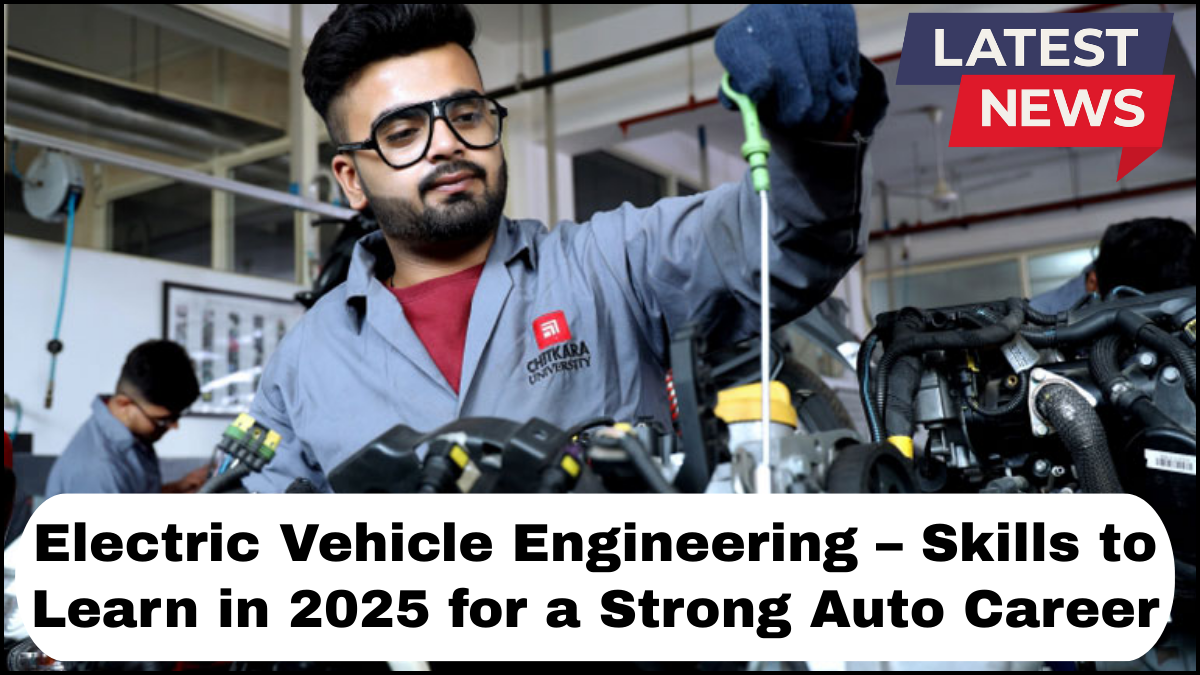Electric vehicle engineering is no longer just a niche within the automotive world — it’s the future. As global demand shifts rapidly toward sustainability, the EV industry is accelerating innovation, job creation, and technological disruption. For professionals looking to thrive in this evolving field, acquiring future auto skills is not just advantageous — it’s essential.
Whether you’re a student, a mechanical engineer, or a software developer eyeing a pivot into the EV space, 2025 will bring new challenges and opportunities. Here’s a breakdown of the most crucial skills you’ll need to build a strong, future-ready career in electric vehicle engineering.

Understanding Electric Powertrains
Traditional internal combustion engines are being replaced by electric powertrains. Understanding their design, operation, and control systems is foundational.
Key concepts to master:
-
Electric motors (AC/DC, BLDC, PMSM)
-
Inverters and converters
-
Transmission systems in EVs (or the lack thereof)
-
Regenerative braking systems
A strong grasp of how these components interact will help engineers design more efficient and high-performing vehicles.
Battery Technology and Energy Storage
Batteries are the heart of any EV. With manufacturers racing to improve range and charging times, expertise in battery chemistry and thermal management is in high demand.
Learn about:
-
Lithium-ion and solid-state batteries
-
Battery Management Systems (BMS)
-
Cell balancing and SOC (State of Charge) estimation
-
Fast-charging technology and safety protocols
By 2025, engineers skilled in energy storage will be critical to both R&D and production roles in electric vehicle engineering.
Embedded Systems and Control Software
Modern EVs rely heavily on software. From motor control to user interface systems, embedded electronics are everywhere.
Important areas include:
-
Microcontrollers and firmware design
-
CAN bus protocols
-
Real-time operating systems (RTOS)
-
Control algorithms for torque vectoring and traction control
Software engineers with automotive specialization will be especially valuable as vehicle automation and digitization increase.
Power Electronics and Electrical Design
A strong foundation in power electronics is essential to understand and improve the performance of EV components.
Areas to focus on:
-
DC-DC converters, inverters, and chargers
-
High-voltage system design
-
Thermal management for electronic systems
-
Electromagnetic interference (EMI) and protection mechanisms
As future auto skills evolve, proficiency in electrical simulation tools like MATLAB/Simulink, LTspice, or PLECS will set you apart.
Charging Infrastructure and Smart Grids
Electric vehicle engineering doesn’t end with the vehicle itself. Understanding how EVs interact with charging networks and the broader power grid is becoming a key competency.
Skills in this domain include:
-
Charging standards (CHAdeMO, CCS, Type 2, etc.)
-
Vehicle-to-grid (V2G) technology
-
Smart charging systems
-
Renewable energy integration
Engineers who can bridge the gap between EV hardware and sustainable infrastructure will be in high demand.
Data Analytics and Predictive Maintenance
With EVs generating massive amounts of real-time data, professionals who can analyze and interpret this data for performance improvement or maintenance planning will be indispensable.
Core topics to master:
-
Data acquisition systems
-
Predictive analytics using machine learning
-
Fault detection algorithms
-
Fleet management platforms
These future auto skills align perfectly with emerging roles in connected and autonomous electric vehicles.
Sustainability and Regulatory Compliance
Understanding the environmental impact of EVs and staying updated on global regulations is increasingly important.
Learn about:
-
Lifecycle analysis of EVs
-
Recycling and reuse of battery components
-
Emission and energy efficiency standards
-
Safety certifications and homologation procedures
Knowledge of sustainability frameworks will be crucial, especially for roles in quality assurance and compliance.
Soft Skills and Interdisciplinary Collaboration
Electric vehicle engineering is a multidisciplinary field. Engineers need more than technical expertise—they must be able to collaborate across domains like software, electronics, materials science, and business.
Develop:
-
Project management capabilities
-
Communication and teamwork skills
-
Agile methodology familiarity
-
Innovation-driven problem-solving
A cross-functional mindset will set future professionals apart in a rapidly changing industry.
Final Thoughts
2025 is shaping up to be a pivotal year for electric vehicle engineering. As the industry matures, the demand for skilled professionals will skyrocket. The key is to align your learning and development with the technologies and systems that will define the next generation of electric mobility.
Whether you’re designing battery packs, programming motor controllers, or building smart charging stations, the right skill set will make you not just employable—but indispensable.
FAQs
What qualifications do I need to start a career in electric vehicle engineering?
A background in mechanical, electrical, or electronics engineering is typically required. Specialized certifications in EV systems, battery management, or automotive software are highly recommended.
Is electric vehicle engineering a good career in 2025?
Absolutely. With governments and automakers investing heavily in EV development, job opportunities across design, manufacturing, and infrastructure are rapidly expanding.
How long does it take to become proficient in electric vehicle engineering?
Depending on your current skill level, gaining proficiency can take anywhere from 6 months (for a transition from a related field) to 2 years with formal education and hands-on experience.
What programming languages are useful in EV development?
C/C++, Python, and MATLAB/Simulink are widely used in embedded systems and simulations for EV applications.
Can mechanical engineers transition into EV roles?
Yes. Mechanical engineers with strong fundamentals can transition by learning about electric powertrains, thermal management, and battery systems.
click here to learn more